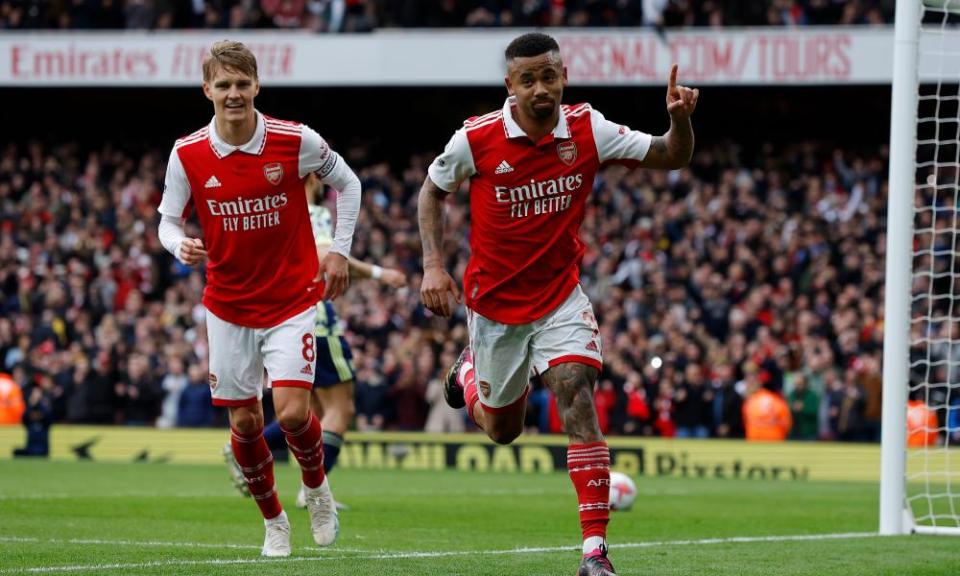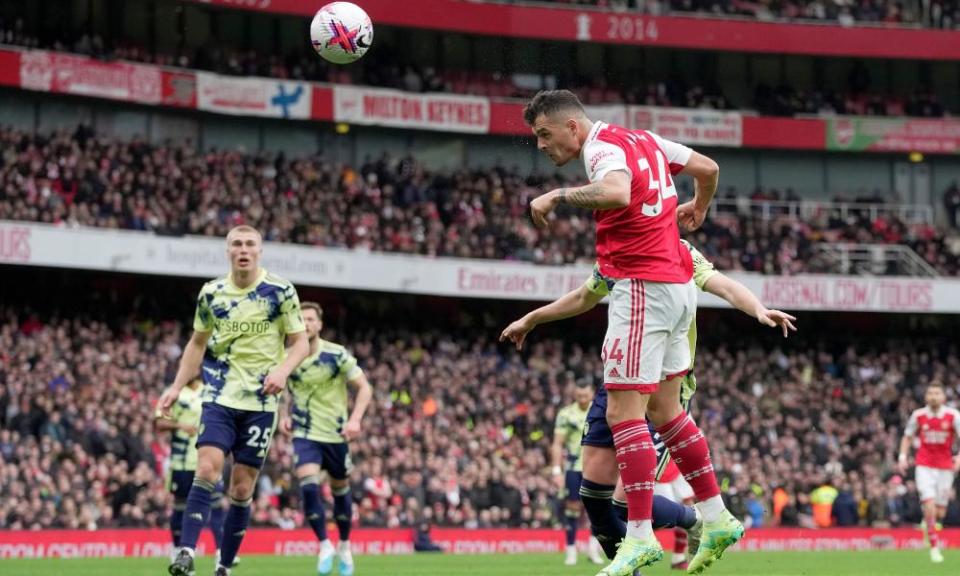Gabriel Jesus has the spellbinding quality that keeps everyone watching

Wrapped up in his warm-down jacket, Gabriel Jesus takes to the field. It’s been more than half an hour since he was substituted, but everyone still wants a piece of him. Opponents want to shake his hand. Fans want to sing his name. Club staff want to make eye contact and slap him on the back. As he takes his lap of honour, a lone camera operator follows him around the entire pitch, training his lens on that soft, twinkling face, a face that for some reason always looks as though it’s on the verge of bursting into tears.
And for some reason there has always been this peculiarly spellbinding quality to Jesus. You watch him not because of what he’s doing, but because of what he might do.
Related: Gabriel Jesus doubles up to see off Leeds and keep Arsenal on track
That shot may well trickle harmlessly wide. That little twist and turn he performs with his back to goal may well end up with him flat on his backside. But because he keeps trying, you want to keep looking. In a sense – and with no pun intended – Jesus is the ultimate act of faith.
So, in another sense, are this Arsenal team. Very occasionally during this deeply weird season there have been sudden moments of piercing clarity when Arsenal fans wonder to themselves: how is this thing happening?
It makes no sense, when you think about it for even a second. Ben White. Leandro Trossard. Aaron Ramsdale. Granit Xhaka. At the start of the season, would you have described any of them as imminent champions? And so perhaps the only real hope for Arsenal is to trust fully in this alternative reality, submit to it, keep doing the things they do without ever really knowing why they do them.
This was Jesus’s first league start in almost four months. He started Arsenal’s first 14 games of the season before suffering a knee injury during the World Cup; they then started 14 without him.
And there is of course a basic paradox here. Nobody seriously contests how crucial Jesus is to the way Arsenal play, the way they compete, the way they attack, the way they score.

So how is it that when he was absent Arsenal looked so similar? Can a player really be indispensable if they can also be dispensed with for half a season with little noticeable effect?
In order to answer this question, it’s worth looking not just at Jesus but the players around him. Take his second goal here, for instance: just his seventh of the season, but perhaps the ultimate expression of Jesus-ball.
He picks up the ball in his classic withdrawn position, hustling for it on the right wing. The space created allows Trossard to barrel through the centre as he gathers Jesus’s pass. The defenders lured away by Trossard have created space for Xhaka and Jesus himself, who are both now flooding into the penalty area.
For a defence, this is like some nightmarish Escher puzzle: a constantly regenerating form of attack in which the same players somehow manage to keep running at you from the same angles, over and over again.
This has in many ways become Arsenal’s signature move: go back and look at how many of their goals this season are essentially Player A passing to Player B, continuing his run, eventually getting the ball back from Player B, and then scoring.
Jesus, with his strength and agility and speed and aggression and ability to manipulate the ball precisely in extremely tight areas, is a player who could have been built for this type of goal.
But the curious thing is that Arsenal carried on scoring them even when he was injured. Occasionally it would be Eddie Nketiah holding the ball up and doing a fine Jesus impression. Occasionally it would be a marauding Xhaka. Trossard has become another potential attacking pivot.
The point is that by some kind of freakish telepathy, Jesus has continued to influence this Arsenal team despite not kicking a ball for months. The movements, the angles, the interchanges. Somehow – and again, no pun intended – Arsenal can feel the presence of Jesus, even when he is not physically present.
Perhaps the most interesting point of contrast between Arsenal and Manchester City right now is the wildly different routes they take to goal: City with their one-man wrecking ball up front, Arsenal with their ensemble cast, their 14 different scorers with no clear distinction between creators and finishers.
It feels ironic, bordering on illogical, that you can take a cast-off striker from last year’s champions and somehow become a better team than last year’s champions. But logic will not be Arsenal’s friend over the coming weeks. The only way of surviving this ride will be to suspend all disbelief until the very end.

 Yahoo Sport
Yahoo Sport 





































